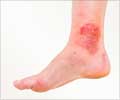Causes / Risk Factors
Psoriasis usually raises its ugly head after a bout of
The causes of psoriasis are not clearly understood. Some believe it to be caused by the excessive growth and reproduction of the skin alone. Others believe that the disease is mediated by the immune system.
According to the latter theory the T-lymphocytes migrate to the dermis of the skin and triggers the release of cytokines, which causes inflammation and elevates production of skin cells. Several studies have confirmed the excessive expression of proinflammatory cytokines, such as TNF-alpha, interleukins and interferon-gamma, in psoriatic patients What triggers this release still keeps everyone guessing!
There appears to be a link between the environmental and genetic factors in the development of this disease. One third of people affected by psoriasis report a family history of the disease.
Researchers have unearthed a psoriasis-associated gene loci and in the case of monozygotic twins, there is a 70% chance of one twin to develop the disease if the other twin has already developed the disease. In dizygotic twins the risk is around 20%.
Although immunosuppressants can control psoriasis, the role of the immune system has not been thoroughly understood. However, the disease usually raises its head following stress (either physical or mental), a skin injury or streptococcal infection.
Some of the other factors that can aggravate psoriasis are-
- Climate change
- Stress
- Medications like - beta blockers ,lithium salt and antimalarials,
- Certain infections
- Smoking
- Alcohol consumption
- Obesity
Environmental factors – Can be important in the reccurrence of psoriasis as it can get aggravated in winter due to the cold temperatures. Sunlight can be of benefit, but constant exposure is not advised. Sometimes in children, excessive sun can result in the disease flare ups.
Drugs - Antimalarial drugs, beta-blockers used to treat high blood pressure, and lithium, a drug used to treat depression and bi-polar disorder, can worsen psoriasis in some individuals. Non-steroid anti-inflammatory (NSAID) drugs, such as ibuprofen or naproxen, used to manage pain and inflammation, can also aggravate psoriasis.
The hormonal changes within the body of growing children can trigger the immune system and make the disease worse.
Stress is an important factor that can trigger worsening of symptoms and cause psoariasis to flare up. During its episode the hormone adrenalin gets released in large amounts and this can stimulate the immune system, resulting in a flare ups.
The cause of psoriasis seems to be multifactorial. Despite all the research advances its causes are not fully understood. Psoriasis affects only human beings and no such disease equivalent is seen among animals.






















